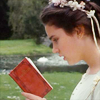
What are you currently reading
Legend of the White-Haired Demoness by Liang Yusheng. I actually read very little of this. Less than a chapter, actually. I feel sad about it.
Tales of the Otherworld by Kelley Armstrong. Short stories and a couple of novellas set at various times and about various characters in the Women of the Otherworld series. About 1/3 of the book of devoted to the terribly romantic backstory about how Clay decided he'd rather his girlfriend be dead than someone he couldn't have, and so decided to try to turn her into a werewolf even though there were literally no female werewoves because olny a few women over a period of centuries survived transitioning into a werewolf. Unsurprisingly, I skipped that once I realized what it was. Other than that, though, i've been enjoying it a lot, and am almost finished. (Pretty much, I enjoy the stories about the characters I enjoyed in their own books, and didn't care about the werewolf short stories in it. So about my feelings for the rest of the series.)
What did you recently finish reading?
Call the Midwife: Shadows of the Workhouse by Jennifer Worth. originally published as Shadows of the Workhouse but repackaged to go with the TV show. Unlike Worth's first memoir, this focuses very little on Worth's personal experiences and instead focuses on several older people she knew while working as a midwife: Frank, Peggy and Jane, who grew up in a workhouse, Sister Monica Joan, and elderly nun who may or may not be somewhat senile, and was born an aristocrat, and Joseph Collett, a former soldier. Almost everything in here was adapted in the last few episodes of the first season (the Sister Monica Joan plot in the series 1 finale is probably the most direct adaptation of events recorded in Worth's memoirs to the show) but unlike the show, Worth focuses primarily on their life stories, based on what they told her and what others related to her, though I'm sure she took more creative license than usual in some parts. (Worth has changed the name of both the church she worked out of and the names of all the people she writes about, and altering details enough so that while people can presumably still recognize themselves and people in events they were around for, their identities wouldn't be obvious to others.) For better or worse, it lacks a lot of the nostalgia of Call the Midwife and Worth has a bleaker worldview in this book, though that's pretty natural given the subject matter. it's very good and very interesting, but also (to no one's surprise) thoroughly depressing in various areas.
I read a lot of the Mistresses book, but then got to the Eva Braun entry where the writer decided to compare Elizabeth Tudor and Hitler. The comparison was in the context of "married to their countries," but nope, you don't compare to Hitler unless there actual attempted genocide involved. Also, it helped click for me what had been bugging me but that I couldn't put my finger on, which was that, while the author liked her subject matter, and didn't seem to like women she interpreted as ambitious and/or seeking personal power.
What do you think you'll read next?
Hopefully more of Legend of the White-Haired Demoness, and I have a couple memiors and YA from the library, along with the latest Miss Fisher book.